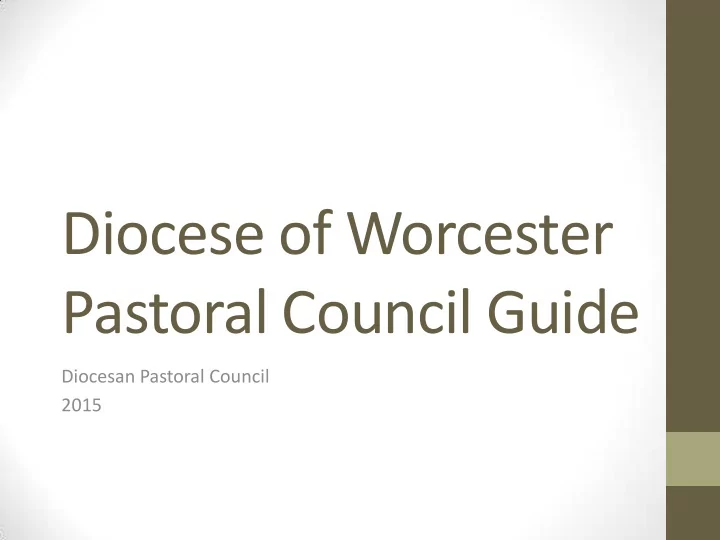

Diocese of Worcester Pastoral Council Guide Diocesan Pastoral Council 2015
What is a Pastoral Council ? A group of dedicated and faithful parishioners that meet on a regularly scheduled basis to advise and assist the pastor in his leadership role of planning, organizing, initiating, promoting, coordinating and reviewing the evangelization, worship, religious education/formation and service activities of the parish.
Why a Parish Pastoral Council ? • Second Vatican Council • Decree on the Apostolate of Lay People #26. “ In dioceses as far as possible, councils should be set up to assist the Church’s apostolic work, whether in the field of evangelization and sanctification or the fields of charity, social relations and the rest…”
Why a Parish Pastoral Council ? • Code of Canon Law (Canon 536 1) “After the diocesan bishop has listened to the Presbyteral Council and if he judges it opportune, a pastoral council is to be established in each parish; the pastor presides over it, and through it the Christian faithful along with those who share in the pastoral care of the parish in virtue of their office give their help in fostering pastoral activity”
The Real Reason ? COMPLEXITY Parish size + social, ethnic, racial, economic, demographic, and geographic diversity + 24/7 news cycle = COM OMPLEX PLEXITY ITY
Today’s Parish • Today’s parish is a complex entity in a sometimes hostile social environment that requires many different skills, talents and gifts to operate successfully.
Functions of the Council • Advise the Pastor on any pastoral issue presented by the Pastor • Present parish pastoral issues raised by the congregation • Prayerfully and thoughtfully investigate and consider issues, documents and information pertaining to the pastor activity of the parish • Offer timely input and recommendations to the Pastor based on their own wisdom, knowledge, and experience
Functions (Continued) • Informally listen, gather and discern information relating to matters presented to the council. • Identify needs and priorities of the parish • Collaborate with the Pastor in giving concrete advise, suggestions, recommendations, and feedback on matters pertaining to living out the mission of Christ in the diocese • Provide a channel of communication between the parishioners and the Pastor
Three Models • Small Parish Model • Mid-Size Parish Model • Large Parish Model • The appropriate model for any individual parish should be based on the pastoral complexity of the parish. The number of parishioners or the magnitude of the budget are simply considerations in assessing the overall complexity of a parish.
Small Parish Model • 4 to 6 members • Selected by the Pastor • Actively engaged in parish life • Reliable and trustworthy • Good sense of parish needs • Have unique skills needed by the parish • Roughly representative of parish demographic • Monthly meetings or as needed, led by the Pastor
Mid-Size Parish Model • 7 to 12 members • Approved by the Pastor • Recruited via Mass announcement, parish bulletin, invited by the pastor or recommended by a parishioner • Actively engaged in parish life • Reliable and trustworthy • Good sense of parish needs • Have unique skills needed by the parish • Roughly representative of parish demographic • Pastor may assign leadership roles or establish sub- committees as needed. • Monthly meetings or as needed, led by the Pastor or lay leadership as assigned by the pastor.
Large Parish Model • 12 to 16 members • Approved by the Pastor • Ministry heads • Parish staff • Actively engaged in parish life • Reliable and trustworthy • Good sense of parish needs • Has unique skills needed by the parish • Roughly representative of parish demographic
Large Parish Model (Cont.) • Recruited via Mass announcement, parish bulletin, invited by the pastor or recommended by a parishioner • Nominated by Parishioners and selected in a parish wide election • Pastor may assign or the council may elect leadership roles and establish sub-committees as needed. • Monthly meetings or as needed, led by the Pastor or lay leadership as assigned by the pastor.
Meetings • Without regard to model type, Parish Pastoral Council meetings should have specific start and end time, an agenda, a leader, secretary and generally last no more than 2 hours. • Agenda • Set or approved by the pastor • Include items raised by council members • Pastoral concerns or suggestions raised by parishioners • The pastor’s vision and plans for the parish • Implementation of directives that come from the Bishop’s office • Updates form ministries • Other items agreed to by the Council and approved by the pastor.
First Task • Parish Pastoral Council Mission Statement • The goal of the Council is to assist the Pastor to promote and implement all that will strengthen, expand and deepen the life of the Parish • Should be: • Clear • Flexible • Short • Understandable
First Task Continued • The Council should seek to: • Proclaim the Good News of Jesus Christ • Build a community of love • Celebrate the liturgies of praise and thanksgiving • Serve others in the name of Jesus Christ • Communicate the Mission Statement in all Parish communications • Move the parish from Maintenance to Mission
Next Steps • Prayerfully reflect on which model might be best for your parish • Seek the advice of trusted members of your parish and fellow clergy • Develop a plan to form a pastoral council • Select members • Schedule the first meeting
Recommend
More recommend